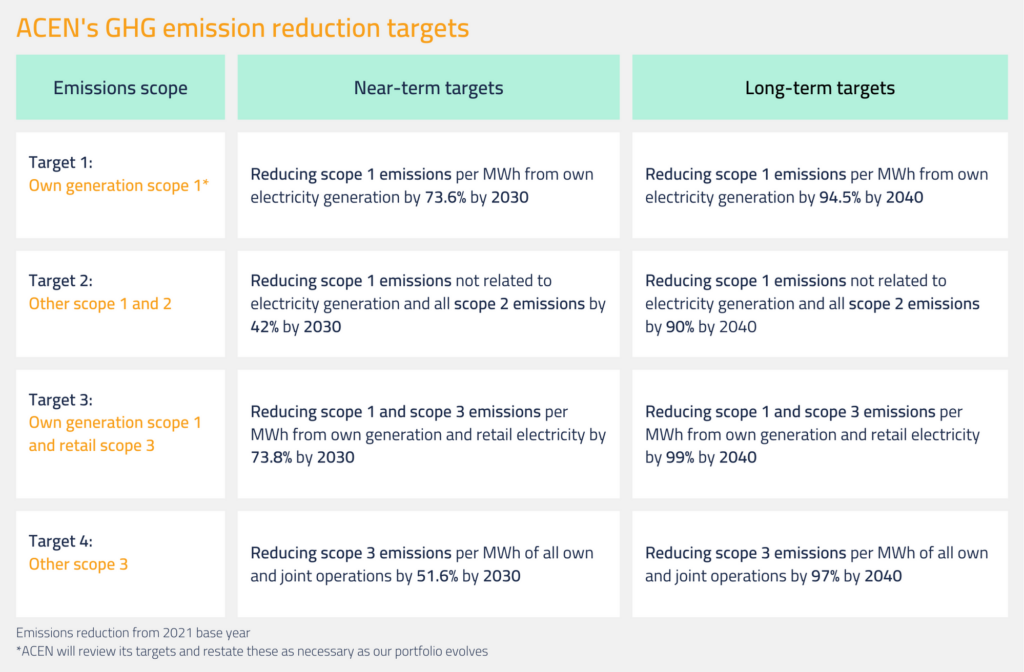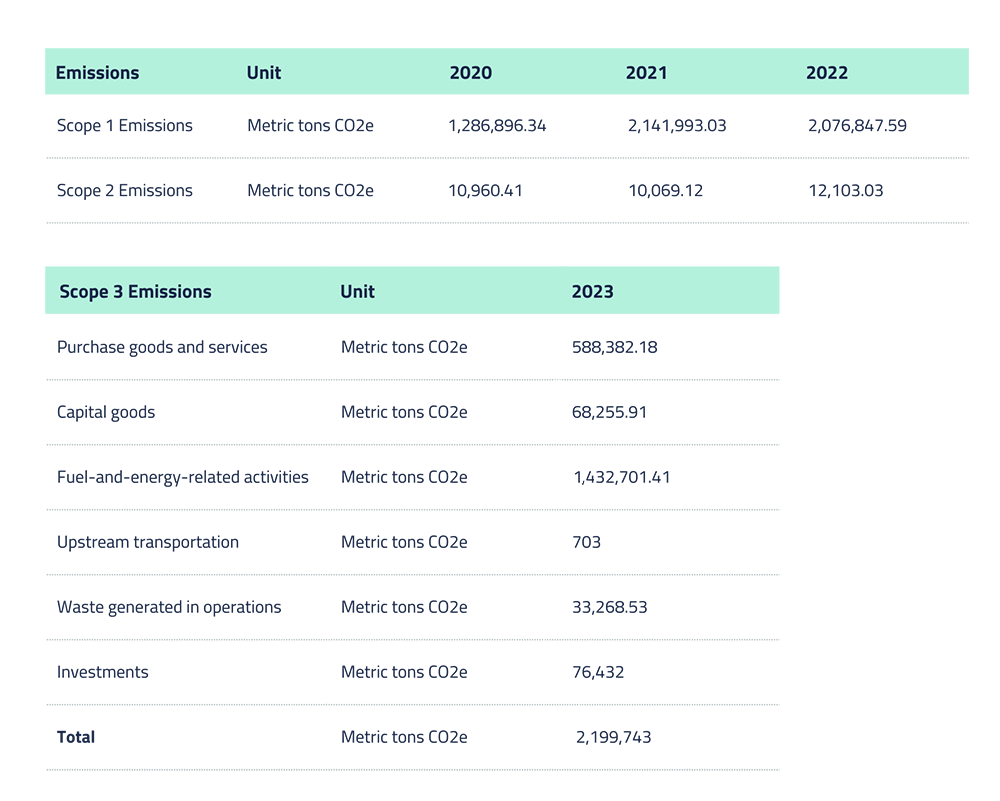- ACEN is the first energy company in Southeast Asia1 to announce its Net Zero roadmap that includes near-term scope 1, 2 and 3 greenhouse gas (GHG) emissions reduction targets, aligned with a 1.5°C pathway for the power sector.
- ACEN’s long-term targets support the company’s net zero ambition and are consistent with the target emissions intensity of the power sector according to best practice emissions reduction modelling for deep decarbonisation of the sector by 2040.
- ACEN’s roadmap outlines targets across four key focus areas of ACEN’s operations and portfolio, including generating assets, retail activity, and joint ventures.
March 31, 2023 – ACEN (PSE: ACEN), the listed energy company of the Ayala group, has developed a robust Net Zero roadmap. The roadmap includes near-term emission reduction targets aligned with the GHG Protocol and the latest climate-science and long-term targets that are consistent with the deep decarbonisation of the power sector. ACEN is the first energy company in Southeast Asia to take this critical step towards achieving Net Zero, providing an accountable and transparent framework for monitoring progress.
ACEN recognizes that to reach the Net Zero outcome for the power sector, it will need to rely on both emissions reduction and neutralisation of residual emissions. As part of its transition plan, ACEN aims to deliver reduction-led decarbonisation by 2040, with an interim target for 2030, and a Net Zero status (including neutralisation) by 2050. This 2050 goal is in line with the broader Ayala group net zero target, while ACEN will continue to explore opportunities to further accelerate these targets in future.
Eric Francia, president and CEO of ACEN, said: “We are pleased to share our progress on our commitment to achieve Net Zero GHG emissions by 2050, including reaching our long-term decarbonisation goals by 2040, with clear milestones providing an accountable and transparent framework for measuring progress. The entire organization and the board fully support this initiative. Our climate ambition is well aligned with our vision to reach 20 GW of renewables by 2030.”
Having announced its commitment to achieve Net Zero GHG emissions by 2050 in October 2021, ACEN has been working towards transitioning the company’s generation portfolio to 100% renewable energy by 2025. ACEN currently owns a generation portfolio of 4,030 MW of net attributable capacity based on ownership stake, with 98% coming from renewable technologies across the Asia Pacific.
Accelerating ACEN’s Net Zero ambition, in November 2022, the company completed the full divestment of its South Luzon Thermal Energy Corporation coal plant using the Energy Transition Mechanism (ETM) framework. This landmark transaction will enable the early retirement of the 246 MW coal plant that forms part of ACEN’s retail electricity activities. Under the mechanism the coal plant will be retired by 2040, reducing its technical operating lifetime by half, and transitioned to a cleaner technology. The transaction, which generated ₱7.2 billion in proceeds for ACEN, will be reinvested into renewable energy projects.
ACEN and the Ayala Group collaborated with global climate solutions provider South Pole in the calculation of a detailed GHG footprint and the development of a robust Net Zero pathway to:
- Achieve near-term emission reduction targets in 2030
- Achieve long-term emission reduction targets in 2040
- Neutralise residual emissions by 2050 and meet Net Zero ambition
To fight climate change, the world has to meet the ultimate goal of reaching Net Zero emissions by 2050. To get there, carbon dioxide emissions from the power sector need to shrink by approximately 60% between 2019 and 2030. At the same time, the Southeast Asia region’s energy consumption is projected to increase by 60% or more, as its electricity consumption doubles by 2040 (IEA). The decisions leaders make now about decarbonisation will determine our collective future.
What it takes for business leaders like ACEN to follow through with their ambitious reduction targets will determine how fast we can achieve a Net Zero energy transition and deliver real impact for one of the world’s most vulnerable regions to climate change. By aspiring to be a Net Zero company by 2050, ACEN is committed to playing its part in this global transition and inspiring others to follow.
***
Annex to press release
ACEN’s approach to GHG emissions accounting is aligned with the GHG Protocol, which is internationally recognized as the leading standard for corporate emissions GHG accounting. The roadmap has been developed with consideration of the latest climate science. The company’s GHG calculation defined its Scope 1, 2, and 3 footprint for 2021, the base year for its targets, and comprehensively detailed ACEN’s emissions from its business operations, including upstream and downstream activities.
ACEN aims to reach Net Zero emissions across its own operations and electricity sales, supported by four GHG reduction targets across the near-and long-term. The targets are aligned with best practice for the power sector.

Target 1 covers scope 1 emissions from ACEN’s own generation activities. ACEN is planning to divest from its remaining thermal assets by 2025 which will significantly reduce emissions from own electricity generation.
Target 2 covers scope 1 emissions from sources other than own electricity generation, such as from fleet vehicles and scope 2 emissions from electricity consumption. Initiatives to meet this target include the procurement of Energy Attribute Certificates (EACs) complemented by installation of solar technologies across sites to reduce grid consumption.
Target 3 covers scope 1 and scope 3 emissions from own generation and retail electricity activities.
Target 4 covers the remaining scope 3 emissions, including purchased goods and services, fuel-and energy related emissions not already covered, upstream transportation and distribution, waste, employee commuting, upstream leased assets and energy and fuel emissions from joint ventures. The long-term target also includes emissions from capital goods and business travel.
The company’s decarbonization strategy to achieve targets 3 and 4 is well aligned with ACEN’s 20 GW by 2030 goal.
ACEN will review its targets and restate these as necessary as our portfolio evolves.

Our Scope 1 emissions include the direct combustion of various diesel and gasoline among our company’s plant equipment, generator sets, and company-owned vehicles, as well as, the combustion of coal in SLTEC. Standards used for the computations are based on the GHG Protocol Corporate Accounting and Reporting Standard. The gases reported include carbon dioxide, methane, and nitrous oxide.
Our Scope 2 emissions include the indirect energy emissions from the purchase of electricity from the national grid. Location-based grid emission factors used for local facilities are based on the Department of Energy (Philippines).
Our Scope 3 emissions are categorized based on the GHG Protocol’s Corporate Value (Scope 3) standards. Emissions associated with employee commuting, business travel, and upstream leased assets have been excluded due to negligible impact relative to other scope 3 categories.
ACEN’s 2022 GHG emissions disclosures follow the operational control approach prescribed by the GHG Protocol.
- Based on research of CDP responses, SBTi website and annual reports ↩︎

